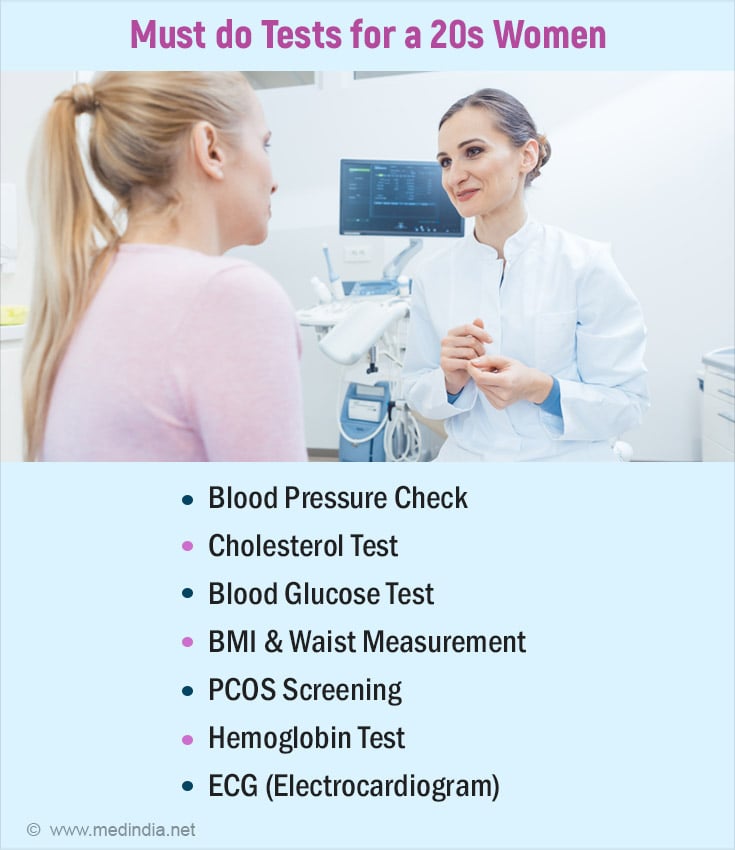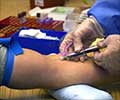- Health maintenance in women - (https://pubmed.ncbi.nlm.nih.gov/23317023/)
About
20s is a period of growth, in becoming the groundwork for a good future. This age is the right time to give attention to your health. Understand what puts your heart at risk and the necessary changes that you can make to keep it healthy well into your sixties ().
Did You Know?
Heart disease is the leading cause of death among women. Get your health tested early to prevent it #healthyheart #womenshealth #medindia
Seven Essential Test for Every Women her Twenties should take
1. Blood Pressure Checks -Check the Silent Killer -Regular Check-Ups
High blood pressure or hypertension, is often referred to as the "silent killer" because it may have no obvious warning signs. High BP results in cardiac episodes such as heart attacks and strokes.
Frequency: It should be checked every two years if the patient's condition is normal to have a hepatic profile; more often if the liver enzymes are high.
Ideal Range: Less than 120/80 mmHg.
Normal blood pressure achieved by healthy living helps prevent later-life heart troubles.
2. Lipid Profile - Getting Your Cholesterol Level Under Control
Cholesterol testing helps you understand your LDL Cholesterol - which is the bad cholesterol, HDL Cholesterol - which is the good cholesterol and Triglycerides - which are the blood fats that affect the heart. High cholesterol deposits on the walls of arteries causing heart disease. It is therefore harmful when accumulated in high amounts in the body.
Frequency: After the age of 35, about once every 4-6 years, or earlier if one has a family history of cardiovascular disease.
Ideal Range:- LDL: Less than 100 mg/dL
- HDL: 50 mg/dL or higher
- Triglycerides: Less than 150 mg/dL
3. Blood Glucose Test - Keep Diabetes at Bay
Measuring your blood glucose levels will assist in the early identification of prediabetes or diabetes, both of which are standard risk factors for cardiovascular disease. Blood vessels as well as the heart take the wrath of high glucose levels in the long run.
Frequency: Starting at age 20, or earlier if you are at increased at least once every 3 years.
Ideal Range: Fasting blood glucose below 100 mg/dL.
4. What About Your Weight - BMI and Waist Circumference
Excess weight, particularly around your waist, can strain your heart and increase the risk of cardiovascular disease. Both BMI and waist circumference are critical indicators of metabolic health.
Frequency: Annually when the patients are brought in for general check-ups
Ideal Range:- BMI: 18.5-24.9
- Waist circumference: Below 35 inches for women.

5. Polycystic Ovary Syndrome (PCOS) Screening -Detect Hormonal Imbalances Early
PCOS can cause insulin resistance, high cholesterol, and heart diseases among women. Metabolic syndrome is associated with PCOS; it is a group of factors that enhances the risks of heart disease. It includes sex hormone tests, ultrasound of the lower abdomen, and assessment of some minor complaints such as irregular menstrual cycle, or pimples.
Frequency: the same as in the previous recommendation if you have signs of the disease or if you have a family history.
6. Hemoglobin (Hb) Test - Eradicate Anemia and Fatigue
Many times, low levels of hemoglobin, which show you have anemia, deprive your body of oxygen and put pressure on the heart. Common for young women, anemia can be caused due to poor diet or heavy periods.
Frequency: Every year and when recommended by your physician or if you're usually tired or dizzy.
Ideal Range: 12-15.5 g/dL for women.
Electrocardiogram (ECG/EKG) - Identify Errors in your Heart Beat
An ECG is a painless test that takes a picture of the heart's electrical activity and in some cases may show an abnormality or a problem. Chest pain, palpitations or dizziness are signs that there could be trouble with the heart and need attention.
Frequency: For women with a family history of heart disease
Taking care of your health, by avoiding negative habits and embracing healthy ones in your 20s creates a strong possibility of a healthier you in the future. Such tests as blood pressure, cholesterol, glucose levels, hemoglobin, and screening for PCOS can be conducted as routine tests to prevent such risks.









